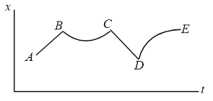H C Verma Solutions for Chapter: Newton's Laws of Motion, Exercise 3: OBJECTIVE II
H C Verma Physics Solutions for Exercise - H C Verma Solutions for Chapter: Newton's Laws of Motion, Exercise 3: OBJECTIVE II
Attempt the practice questions on Chapter 5: Newton's Laws of Motion, Exercise 3: OBJECTIVE II with hints and solutions to strengthen your understanding. CONCEPTS OF PHYSICS [VOLUME 1] solutions are prepared by Experienced Embibe Experts.
Questions from H C Verma Solutions for Chapter: Newton's Laws of Motion, Exercise 3: OBJECTIVE II with Hints & Solutions
A reference frame attached to the Earth
A particle is found to be at rest when seen from a frame and moving with a constant velocity when seen from another frame . Mark out the possible options.
The figure shows the displacement of a particle going along the -axis as a function of time. The force acting on the particle is zero in the region

The following figure shows, a heavy block kept on a frictionless surface and being pulled by two ropes of equal mass . At , the force on the left rope is withdrawn but the force on the right rope continues to act. Let and be the magnitudes of the forces by the right rope and the left rope on the block, respectively.

The force exerted by the floor of an elevator on a standing person's foot is more than the weight of the person. This situation occurs if the elevator is
If the tension in the cable supporting an elevator is equal to the weight of the elevator, the elevator maybe
A particle is observed from two frames and . The frame moves with respect to with an acceleration . Let and be the pseudo forces on the particle when seen from and respectively. Which of the following are not possible?
A person says that he measured the acceleration of a particle to be non-zero while no force was acting on the particle.
